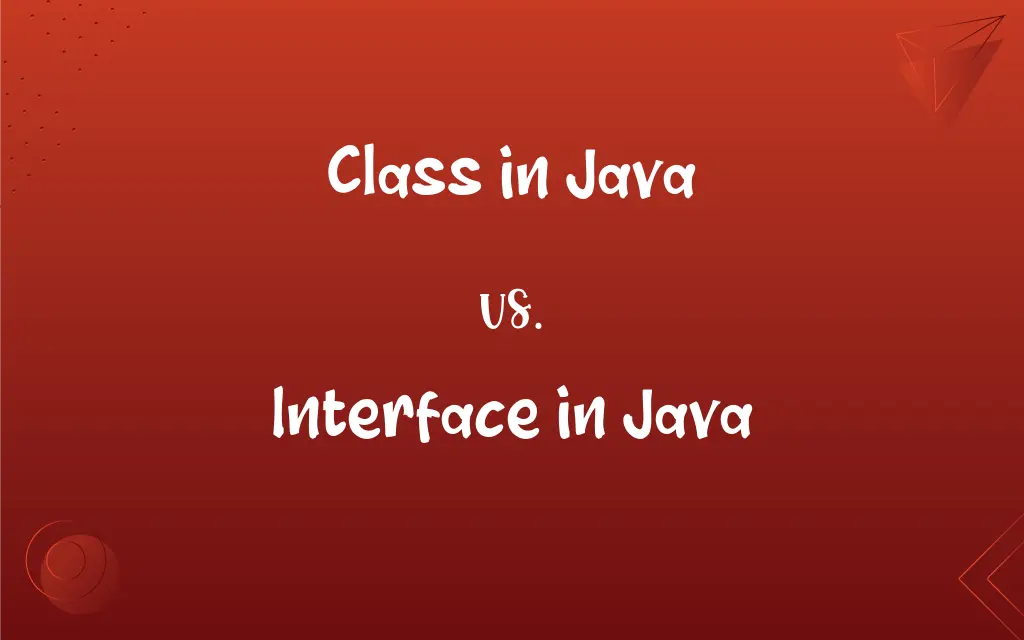Class in Java vs. Interface in Java: What's the Difference?
Edited by Aimie Carlson || By Janet White || Published on February 14, 2024
In Java, a class is a blueprint for objects with state and behavior, whereas an interface is a contract defining methods without implementing them.

Key Differences
A class in Java is a fundamental concept representing a blueprint from which objects are created. It encapsulates data and methods that operate on the data. An interface, on the other hand, is an abstract type used to specify a behavior that classes must implement, without providing the implementation of these methods.
In a class, methods can have concrete implementations, and it can hold state through instance variables. Interfaces, in contrast, typically contain no state and only abstract methods (though Java 8 and later allow default and static methods in interfaces).
A class supports the concept of inheritance, allowing one class to inherit the characteristics of another. Interfaces, however, are used to implement polymorphism in Java, enabling a class to implement multiple interfaces and thereby follow multiple inheritance of type.
When defining a class, it's about defining a new data type that includes both data and methods to manipulate that data. With interfaces, it's about defining a contract that any implementing class must adhere to, ensuring a certain level of consistency in functionality.
Java restricts a class to extend only one other class (single inheritance), but it can implement multiple interfaces, offering more flexibility. Interfaces provide a way to circumvent Java's restriction on multiple inheritance, allowing a class to exhibit behavior from multiple sources.
ADVERTISEMENT
Comparison Chart
Nature
Blueprint for objects.
Contract for methods.
Implementation
Can have fully implemented methods.
Cannot have fully implemented methods (prior to Java 8).
State Storage
Can hold state in fields.
Typically does not hold state.
Inheritance
Supports single inheritance.
Allows multiple inheritance of type.
Use Case
Defines properties and behavior of objects.
Defines a standard contract for classes to implement.
ADVERTISEMENT
Class in Java and Interface in Java Definitions
Class in Java
It can include fields (state) and methods (behavior).
Class Car { void drive() { /*...*/ } } has a drive method.
Interface in Java
It can contain abstract, default, and static methods.
Interface Drawable { default void draw() { /*...*/ } } has a default method.
Class in Java
A class is a template for creating objects, encapsulating data and methods.
Public class Dog { private String name; } defines a Dog class.
Interface in Java
Used for achieving abstraction and multiple inheritance.
Class Bird implements Flyable { /*...*/ } implements Flyable.
Class in Java
Encapsulates and hides internal data using access modifiers.
Class Account { private double balance; } uses encapsulation.
Interface in Java
Enhances flexibility and reusability in code design.
Interface Sharable { void share(); } for shared functionality.
Class in Java
A class supports the concept of inheritance.
Class ElectricCar extends Car { /*...*/ } inherits from Car.
Interface in Java
An interface is a contract for classes to implement specific methods.
Interface Flyable { void fly(); } requires fly method.
Class in Java
Classes can have constructors to initialize new objects.
Public class Book { Book() { /*...*/ } } has a constructor.
Interface in Java
Interfaces cannot hold state and are typically used to define behaviors.
Interface Readable { void read(); } defines a behavior.
FAQs
What defines a class in Java?
A blueprint with state (fields) and behavior (methods).
Can a class implement multiple interfaces?
Yes, a class can implement multiple interfaces.
What is an interface in Java?
A contract specifying methods that implementing classes must provide.
What is the purpose of a constructor in a class?
To initialize a new instance of the class.
Can an interface extend another interface?
Yes, interfaces can extend other interfaces.
What access modifier do methods in an interface have by default?
All methods in an interface are public by default.
Can a class have private or protected fields?
Yes, classes can have private and protected fields.
How do classes and interfaces differ in inheritance?
Classes support single inheritance, while interfaces allow multiple inheritance.
Can you instantiate an interface?
No, interfaces cannot be instantiated directly.
Can a class in Java be abstract?
Yes, a class can be abstract, meaning it cannot be instantiated.
Is it mandatory for a class to have methods?
No, a class can be without methods.
What’s the use of implementing an interface?
To ensure a class adheres to a specific behavior contract.
How do class fields and interface fields differ?
Class fields can be non-static and mutable, while interface fields are static and final.
Can a class inherit from multiple classes in Java?
No, Java does not support multiple class inheritance.
What are abstract methods in an interface?
Methods declared without an implementation.
Can interfaces in Java have fields?
They can have static final fields, which are constants.
What happens if a class doesn't implement all interface methods?
The class must be declared abstract.
What role do interfaces play in polymorphism?
They enable a class to be referenced in multiple forms.
How do default methods in an interface work?
They provide a default implementation that can be overridden by implementing classes.
Can interfaces have constructors?
No, interfaces cannot have constructors.
About Author
Written by
Janet WhiteJanet White has been an esteemed writer and blogger for Difference Wiki. Holding a Master's degree in Science and Medical Journalism from the prestigious Boston University, she has consistently demonstrated her expertise and passion for her field. When she's not immersed in her work, Janet relishes her time exercising, delving into a good book, and cherishing moments with friends and family.
Edited by
Aimie CarlsonAimie Carlson, holding a master's degree in English literature, is a fervent English language enthusiast. She lends her writing talents to Difference Wiki, a prominent website that specializes in comparisons, offering readers insightful analyses that both captivate and inform.







































































